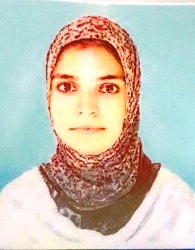by Qudsia Gani
Popularly known as Al-Kindi, Abu Yusuf Ya‘qub ibn Ishaq lived between 801 and 873 CE. He was known in both the later Arabic and the Latin traditions for his writings on astrology. Al-Kindi is not Persian nomenclature but is derived from Kinda, a great Arab tribe. The need to say this is that many famous Arab scientists and thinkers are being falsely labelled as Persians.

A Rip In Space, An Art Work by Sadokonline
Al-Kindi was the first self-identified philosopher in the Arabic tradition whose works in mathematics and astronomy are quite extensive. He became a prominent figure in the House of Wisdom, and a number of Abbasid Caliphs appointed him to oversee the translation of Greek scientific and philosophical texts into the Arabic language. This contact with the philosophy of the ancients had a profound effect on him, as he synthesized, adapted and promoted Hellenistic and Peripatetic philosophy in the Muslim world. He subsequently wrote hundreds of original treatises of his own on a range of subjects ranging from metaphysics, ethics, logic and psychology, to mathematics, astronomy, meteorology, astrology, optics medicine, pharmacology, and further to more practical topics like perfumes, swords, jewels, glass, dyes, mirrors, tides and earthquakes.
Using his mathematical and medical expertise, he was able to develop a scale that would allow doctors to quantify the potency of their medication.
In the field of mathematics, al-Kindi played an important role in introducing Indian numerals to the Islamic world, and subsequently the Arabic numerals to the Christian world, along with Al-Khwarizmi. Al-Kindi was also one of the fathers of cryptography. Building on the work of Al-Khalil (717–786 CE), Al-Kindi’s book entitled “Manuscript on Deciphering Cryptographic Messages” gave rise to the birth of cryptanalysis.
It is also pertinent to mention that while as the famous scientists like Galileo and Newton had called all physical laws as absolute, Al-Kindi asserted that these were relative.
Al Kindi is said to have put forth an unproven theory of relativity 1100 years before Einstein. In his book Al-Falsafa al-Ula, Al-Kindi exemplifies someone who sees an object whose size is smaller or larger according to the vertical movement between earth and sky. If the person is up to the sky, he would see the smaller trees but if he moves into the earth, he would see the trees becoming larger. According to Al-Kindi, objects, time, movement and space are not only relative to one another, but also to other objects and observers who monitor them.
However, we do not have a fair idea of how far he went to finally accomplish a theory on relativity. The aim here is not to overrate Al-Kindi or underrate Einstein because that will be equivalent of somebody saying that an ancient Hindu who developed decimal notation has been overlooked as the discoverer of calculus. But given his genius, it seems not unlikely of him, with an added advantage of being a Muslim scholar might have received catchy clues from the following verses of the glorious Quran throwing direct hints at the relativistic phenomena of length contraction and time dilation.
“…. A day with your Lord is as a thousand years of those years which you count.” (Surah: Al-Hajj: verse 47).
“He set the affair from heaven to earth, then the (business) it’s up to him his day in a single measure (length) is a thousand years of your reckoning.” (Surah: As-Sajda: verse 5).
“That comes from God, who have places up. The angels and Gabriel up (face) to the Lord in the day that measure fifty thousand years.” (Surah Ma’arij: verses 3-4).
“And you see those mountains, you would have thought he was still in place. Though he is running as the way the clouds. (That’s) act of God that makes a sturdy all things; surely Allah is Aware of what ye do. “(Surah An-Naml: 88).
“He will say: ‘How many years did you live on earth?’ They said: ‘We stay (on earth) a day or half-day, but ask the people who count.’ He said: ‘You do not stay (on earth) but briefly if you really know’.” (Surah Mu’minoon: verses 112-114)
Though al-Kindi often held ancient philosophers (such as Aristotle) in high regard, he also criticized them for making claims regarding natural philosophy without providing any empirical proof or scientific demonstration. In many instances, al-Kindi used experiments and quantitative methods to verify many of his own theories, as he recognized the importance of direct observation and empiricism as a source of scientific knowledge. He would often set up specific laboratory apparatus in order to carry out his experiments.
In his Kitab al-Shu’a’at (Book of the Rays), al-Kindi wrote the following criticism on Anthemius of Tralles for reporting how ships were set aflame by burning mirrors during a naval battle without empirical evidence. “Anthemius should not have accepted information without proof. He tells how to construct a mirror from which twenty-four rays are reflected on a single point, without showing how to establish where the rays unite at a given distance from the middle of the mirror’s surface. We, on the other hand, have described this with as much evidence as our ability permits, furnishing what were missing, for he has not mentioned a definite distance.”

Qudsia Gani
This speaks of Al-Kindi being quite in tune with the most basic tenet of scientific investigation where it is more important to think clearly and be specific to a particular problem, rather than making any general propositions.
Just as today, we are in dire need of a corona specific vaccine notwithstanding the availability of N number of virus antidotes, because each disease is distinct from the other.
However, the central theme underpinning al-Kindi’s works is drawing the compatibility between philosophy and sciences. Many of his works also dealt with the subjects that theology had an immediate interest in. These include the nature of God, the soul and prophetic knowledge. But despite the important role he played in making philosophy accessible to Muslim intellectuals, very few of his texts are available for modern scholars to examine.
(Author teaches Physics at the Government Degree College for Women, M A Road, Srinagar)
from Kashmir Life https://ift.tt/2ZFLP8n
via IFTTThttps://kashmirlife.net
No comments:
Post a Comment